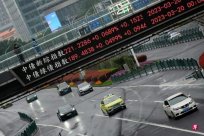Recently, there are many gatherings and large forums in Singapore. I met an old friend a few days ago. He asked the recent situation in Beijing and stated distressedly that he could no longer go to China.The previous years were due to the epidemic, and this year was because the company he served did not allow him to set foot in China.
I was wrong, and thought I had heard it wrong: "Your company prohibits you from going to China?"
I was wondering. I remembered that my friends served in large multinational companies, and specifically responsible for the research of government relations, including tracking and analyzing China's political and economic situation to evaluate the risk of large -scale and long -term investment in China.This was a very professional and normal job, but in the strong atmosphere of Beijing's capture spies and preventing leaks since March this year, it has become a high -risk industry.
The Chinese government implemented a new revised anti -spy method in July, "the scope of the object of secret theft in moderation" and clearly incorporated the "documents, data, data, and items that are related to national security and interests" into protection;Increase the official law enforcement authority of official law enforcement in the investigation and disposal.At that time, many comments were worried that this would lead to the cold cicada effect, further affect China's attractiveness of foreign investment, and it was also "decoupled" with international enterprises by China.
Friends' personal experience shows that the so -called cold cicada effect is by no means exaggerated words. Large multinational companies have felt pressure and rushed to formulate various regulations to protect employees.
Anti -spy law is a deterrent in legal provisions.For multinational companies, the greater shock was that the employees of the Shanghai Branch of the US Consulting company Bain in April this year were rated by the police.Earlier, the five Chinese employees of the US Smart Group of the United States due to their duties were also detained, and its Beijing Office was closed.
Objectively speaking, as Sino -US relations continue to intensify, international investors need to conduct more meticulous security assessments, which prompts consulting researchers to collect more key information.In this case, China has strengthened confidentiality, but the official information and data are "related national security and interests", and the definition is very broad, which allows more people to be in the risk of possible investigation.
Recently, there have been news that foreign companies have been banned from exit in China.According to the Wall Street Journal, a executive of a US risk consulting company Kroll in Hong Kong was banned from leaving mainland China in July to assist official investigating a case several years ago.A senior investment bank in Nomura also told the company recently that he could not leave mainland China.
My Singaporean friends are not consulting or banking, but in order to prevent executives fall into the dilemma of being prohibited from leaving, his company has formulated high -level lists that are not allowed to visit China.Not only that, the company also divides multiple departments into China and Africa parts to block risks.In this case, how will this large multinational company think of China's investment prospects and what kind of investment strategy to China?The answer can be imagined.
Coincidentally, I heard that an expert who served as a higher vocational school in China was included in the "no listing list."This senior expert was not in trouble and was banned from exiting the country, but that the Chinese government re -entered Huawei's chief financial officer Meng Wanzhou in Canada a few years ago in order to avoid being abducted abroad abroad.Chinese officials believe that under the current international atmosphere, the risks that important people are detained after entering the country must be faced.
Foreign company executives avoid entering China, some Chinese experts have been "forbidden" in China -this situation of self -restrictions on each other clearly reflects the mutual distrust and even fear of China and the outside world. Chinese and foreign exchanges and businessCooperation is hard to be hindered.
In fact, even in general folk Chinese and foreign exchanges, it has become increasingly inconvenient in recent years.Under the requirements of strictly governing the party and strictly managing and supervising cadres, China has adopted strict regulations on civil servants. If cadres at or above the office are not official, public security organs and units are required to be approved by private security agencies and units.As for foreigners to visit or do business in China, they have to suffer difficulties without the difficulty of booking tickets for the mainland mobile phone number, and the suffering of the online car. It feels difficult to do.
These seemingly insignificant trivial matter, but the Chinese government has been delayed to solve it, and is issuing a signal: how many foreigners come to China for cultural or business travel exchanges, not what it is very concerned about.
Where did the foreigners go in Chinese cities?Since the unblocking of this year, the situation where the exchanges of Chinese and foreign exchanges that the outside world had been expected have not occurred, but they have ushered in a colder situation.The official data of the South China Morning Post showed that in the first six months of 2023, the Chinese travel agency received 477,800 foreign tourists, only 5.58%of the same period in the same period in 2019.
This is just the number of receptions of travel agencies, not the accurate number of entry passengers, but the reduction of personal shadows in China in China is an indisputable fact.There are many reasons, not only the anti -espionage law, but also the influence of international tourism recovery speed, the convenience of applying for visa visa in China, and the opposition of the East and West atmosphere.
Some of them are not unilaterally controllable in China, but some are improved by China.Although both China and the United States claimed that they had no intention of disappointing chain, the detachable chain was really in the event, and both sides were expanding their decircation trends.China and the United States have erected high walls in the circulation of information and personnel, and the local decourse parts of the East and the West will have evolved for a while, and there is no hope of reversal for the time being.




